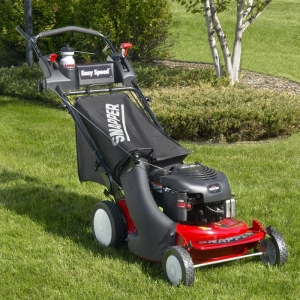Bell Helps Save Government Dollars with Fuel Additives
The federal government doesn't have the best reputation for spending tax dollars wisely. Some of us are old enough to remember the stories from the...

With all the frigid winter weather we've been having (Boston? Serious? 108 inches of snow?), it's easy to forget the spring is not that far away. The weather will finally warm up and people will be busting out their lawn equipment from storage.
 The start of the spring and summer use season is the best time to treat the fuel to ensure you'll have the best performance possible from your small engine.
The start of the spring and summer use season is the best time to treat the fuel to ensure you'll have the best performance possible from your small engine.
But how to choose the best lawn mower additive? Easy - just follow these recommendations and you'll be good to go.
The whole reason you're looking to use a fuel additive are: you want to make it run the best it can, and you want to keep it running.
A lawn mower fuel additive should help you do both.
Make it run the best it can makes the additive should keep the engine and carburetor clean while taking away of any water that the gasoline (because of the ethanol content) has absorbed.
Keeping it running means it needs to prevent corrosion damage and the softening of rubber and plastic from exposure to the ethanol present in most gasolines today. It also helps if it contains some kind of lubricants that the fuel will deliver to engine parts that will benefit from it.
There's lots of small engine additive options that are pretty expensive. The thing to watch is how much it costs to treat each gallon of fuel. You can buy a bottle of small engine additive that costs four bucks, but if it only treats a couple gallons of fuel, you're looking at two bucks per galloon of cost to treat.
There's no reason to pay that much.
There are excellent, effective options that cost a whole lot less than that, less than 20-30 cents per gallon to treat. And it's even better if.......
A little known secret in the industry is that you can use just about any small engine additive in larger engines that run on the same fuel. They just label the additives as "small engine treatment" because it's a marketing differentiation. People gravitate towards things labelled for specific uses. So they see "small engine treatment" and that's what they want to buy for their lawn mower.
In reality, if you select a good gas or ethanol treatment, you really can use it in both your lawn mower and your car/truck. It's going to do the same thing in both of those places.
And this is good news because this means if you buy a bottle of concentrated fuel additive, you don't have to wait five years to use it up. You can use it in your car, truck, lawn mower, weed whacker, whatever you have to runs on gasoline and ethanol blends. And you'll get the best bang for your buck.
The federal government doesn't have the best reputation for spending tax dollars wisely. Some of us are old enough to remember the stories from the...

Now that drivers spent 2011 learning about how bad ethanol was for them, the big question in 2012 is going to be where can I find gas without...
April is Lawn & Garden Month, or National Garden Month as the National Gardening Association calls it. People are starting to break out their lawn...